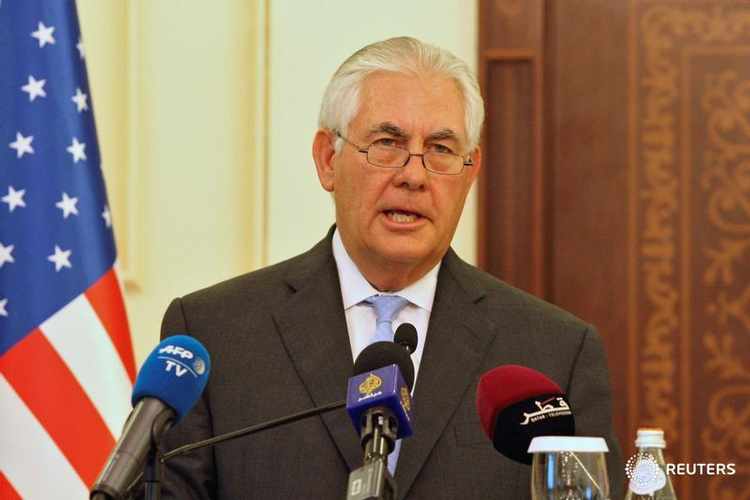Tillerson Sees Qatar Crisis Lingering With Talks Elusive

EghtesadOnline: U.S. Secretary of State Rex Tillerson said a dispute between a Saudi Arabian-led bloc and Qatar may last “quite a while” as the two sides still refuse to speak to each other directly and are no closer to resolving the key demands made after the crisis started.
Despite leaving the Middle East after four days of shuttle diplomacy without a breakthrough, Tillerson said progress was made. Potential ways forward in the dispute were weighed by both sides and there is a “changed sense of willingness to at least be open to talking to one another and that was not the case before I came,” Tillerson said Thursday evening while en route to Washington from the Persian Gulf region.
Nevertheless, “the final and ultimate resolution may take quite a while,” Tillerson said. “But if we can begin to have some success beginning to take some of these issues off the table because we now have a way to move forward then I’m hoping that will start the process of returning, normalizing relations.”
According to Bloomberg, Tillerson sought to tap his previous experience as Exxon Mobil Corp.’s CEO, where he frequently met and negotiated with Gulf leaders, to resolve the dispute sparked last month when Saudi Arabia, the United Arab Emirates, Bahrain and Egypt cut diplomatic and trade links with Qatar. The bloc accuses Qatar of supporting terrorism, meddling in their internal affairs and cozying up to their rival Iran -- all charges that Qatar has denied.
‘More Complex’
Some of the demands “I do think can be addressed up front fairly quickly, some of them are going to be, I think, more complex,” Tillerson said.
In one sign of just how long the road ahead is, U.A.E. Foreign Minister Anwar Gargash said the sides are “far away” from a solution.
“I see Qatar crisis heading to ‘calm fire’ as the neighbor doesn’t see the need to reconsider its policies,” he said on Twitter. “All sides will exercise according to our national interests.”
This week’s diplomacy may be followed by another round of negotiations involving the U.S., the U.K. and the Saudi-led bloc, which has agreed to study Tillerson’s ideas, as early as next week, according to three officials with knowledge of the deliberations.
The continuing engagement amounts to “subtle progress” in untangling a long-developing conflict, State Department spokeswoman Heather Nauert told reporters Thursday in Washington.
The conflict pits close U.S. allies against each other.
Qatar boasts one of the largest sovereign wealth funds, with stakes in global companies from Glencore Plc to Barclays Plc as well as landmark London properties. Its influence goes beyond money. The small peninsular nation hosts the regional headquarters for U.S. Central Command, which includes a state-of-the-art air base the Pentagon depends on to target Islamic State.
Saudi Arabia also has significant U.S. investments as well as strong counterterrorism ties with the American military, and it’s a top customer for American weapons makers.
There was a modest victory for Tillerson’s efforts this week when the U.S. and Qatar signed a memorandum of understanding on July 11 laying out steps the two countries will take over the coming months and years to interrupt and disable terrorist financing flows. The Saudi bloc said that pact “isn’t enough” to resolve the crisis. They also said the accord came about thanks to years of pressure from the bloc, according to a joint statement carried by the official Saudi Press Agency. And they vowed to maintain the recent measures against Qatar until their demands are met in full.
The standoff has taken a toll on the Qatari economy. Food prices rose at an annual level of 2.5 percent in June, the most since 2015, and ratings agencies have downgraded the nation’s credit worthiness. While the “impact seems manageable,” non-oil economic growth will likely slow down to below 4 percent this year from 5.6 percent in 2016, according to Abu Dhabi Commercial Bank.
Regardless, Tillerson’s concerted efforts toward a deal helped put Qatari stocks on course for their best week since the crisis erupted on June 5.
U.S. Mediation
After taking part in the Group of 20 summit in Germany last week, where he and President Donald Trump met with Russian President Vladimir Putin, Tillerson flew to Ukraine, Turkey and then the Middle East in what amounted to his most extensive effort to date at shuttle diplomacy.
The memorandum of understanding with Qatar and Tillerson’s diplomacy reflected how the U.S. is now deeply entrenched in mediation, though the State Department has repeatedly said that Kuwait, not Tillerson, is leading the effort.
The top U.S. diplomat held talks with Qatar’s Emir Sheikh Tamim bin Hamad Al Thani on Thursday before departing for Washington. He spent much of the previous day in Jeddah, Saudi Arabia, where he traveled back and forth between the royal court for visits with the king and the crown prince and an airport terminal reserved for visiting dignitaries. He met with the four foreign ministers of the Saudi-led alliance, plus a Kuwaiti mediator.


